The headteacher undoing the damage of lockdown – by introducing a 12-hour school day

Andrew O’Neill can still recall the buzz that was in the air when the children came back to school after lockdown. Finally, the corridors of All Saints Catholic College in Ladbroke Grove were filled with the sound of teenagers joking and jostling again. “For the first six weeks it was amazing. They were delighted to be back, they were delighted to be together, there was lots of playing, lots of excitement.”
But it didn’t take long to notice something had changed, that there had been a fundamental shift in these children. They seemed distant and lethargic – they lacked a “sense of belonging” to the school and an energy that they had once had. “Really quickly we noticed that there were some real issues with young people,” says O’Neill, headteacher of the west London secondary school. “Quite a lot of children were a bit apathetic and wanted to be isolated from others.”
If you asked students if they wanted to sign up for an extracurricular activity, for instance, “they’d be like nah, I’m just going to go home,” says O’Neill
“[They were] wanting to be real homebirds. Because of course, we had habitually made children into homebirds in lockdown. We realised we need to break this and change something here.”
Their “soft skills” had taken a knock too. They were “not as good at holding a conversation or eye contact”. “You could be talking to a child about what they wanted to do for their A-levels and they’d say ‘dunno’,” says O’Neill.
Teenagers aren’t known for being enthusiastic, but O’Neill says this was “a different type of apathy”.
“I’ve worked with teenagers for 20 years. You’ve always had that ‘I don’t care’.”
Now, he says, “you meet the parents and they say ‘they’re not interested in doing anything, we can’t get them to do anything’. That’s what we’re seeing at school.”
The reason, he suspects, is a fatal combination of lockdown and a smartphone addiction that had spiralled out of control. And the two are connected. All Saints, like so many others, delivered work in the pandemic via the children’s smartphones. It was an efficient way to teach remotely, but O’Neill says it only served to embed their addiction even further.
“What we’ve done is we’ve completely legitimised smartphones for children as a society, and we’ve completely legitimised education being delivered through them. Now, there are so many apps tailored towards education. The children get their homework timetable delivered on their device.”
Going back, says O’Neill, “is going to be really difficult”. He is dismissive of recent news that ministers are considering banning the sale of phones to under-16s. “If you ban a smartphone, good luck policing that. Banning things is a quick fix for the families who will follow it, but you guarantee that the families who don’t and the children who don’t will be from the most socioeconomically deprived families.”

His own solution? To extend the school day. O’Neill is in the first week of a pilot programme he is rolling out, giving families the chance to sign their children up to a 12-hour school day, with breakfast served from 7am and an after-school provision that runs until 7pm. 120 have signed up to the trial run, which sees the hours after the school day filled with supervised homework, sport, drama, cooking and an evening meal in which they all sit around and talk. His hope is that it will give them a few more hours without their phones and reconnect them with their peers and their school.
“It’s occupying the children and their time in a really constructive way,” says O’Neill, 42, who has been headteacher here since 2016 and is credited with turning All Saints around from the “least popular school in London” to an Outstanding Ofsted school.
We are talking in O’Neill’s office. Outside, the playground is alive with the sound of morning break time. In many ways, he says, All Saints is a typical London inner city school. Half of the pupils are either on free school meals or have been in the past six years; a quarter have special educational needs. “We’re very much on the extremes of those indicators in terms of socioeconomic deprivation and the challenges that we face in school.”
You can see Grenfell Tower from many of the classrooms. “At the time we had children who were in the tower.” Thankfully, they “all escaped”.
“But everyone in the school knew somebody connected. And on the day you could see the tower on fire and there was debris blowing into the school.”
All Saints was renovated two years ago – the growth in admissions led to significant investment from the local authority, Kensington and Chelsea, as well as the diocese – and feels smart and bright. The student body has “more than doubled in size in the space of eight years” to 900. Even so, they are able to offer class sizes of just 20 in year seven. Though you don’t have to spend much time here to see this is a happy, thriving school, O’Neill says they can only do so much while smartphones and social media continue to curb their pupils’ childhoods.
“Children now are getting a phone-based childhood,” says O’Neill, who grew up in Darlington, the son of a headmaster who was also known for turning struggling schools around. “We had a play-based childhood. I had a childhood which was very much home from school, out of my uniform, into my clothes, out on my bike, playing football, out doing stuff with other children and having meaningful interactions and relationships where genuine emotions were coming out and being expressed. That doesn’t happen now.”
Phones, he says, are getting in the way of that; they’re making children more inward looking and “extremely vain”.
“Now, children are on performance mode at school, looking a certain way, being a certain way and then they get home and they’re on performance mode online because they have to come across a particular way, look a certain way in a selfie.”
A father of three young daughters, he and his wife Claire, an education advisor to the diocese of Westminster, are adamant their girls won’t have social media until they are “way, way older”. “I think I could definitely be better [with my phone] in front of my children. They tell me off and I feel really guilty and put it away.”
That idyllic “out on your bike” childhood he speaks of isn’t realistic in 2024, is it?
“I think what’s happened in the last 30 years is we’ve become obsessed with the physical safety of children,” he says. “And understandably – that’s essential for safeguarding purposes. But Jonathan Haidt [the American social psychologist and author of The Anxious Generation] argues to some degree we’ve gone a little bit too far.”
Would he agree? “I certainly look at where some of our families live and they need to be kept physically safe,” he says. “We’re in London and we’ve seen what physical harm 14, 15 and 16 year olds come to.
“But we obsess about physical safety to quite a large degree. And then we go: the antidote to it is keep them home. What are they then going to do at home? Oh, they’ve got their phone.
“Then we let them delve into a world of social media and the internet. What safety measures are being put in place? What psychological harm is coming to children just by having unfettered access to any app?”

All Saints has a no-phones policy (the children have to keep them in their bags or they’ll be confiscated) but they can’t control what happens at home. “You see them leave school and it’s straight on.” Then they “look at their devices through the evening”.
“We talk to some parents and they say [their children] were on it until three, four o’clock in the morning and we’re like ‘Why? You need to take it off them. That’s not OK.’”
It is, he acknowledges, “unbelievably hard” to be a parent of teenagers at the moment – tech companies have them over a barrel. But they need to do all they can to take control of their children’s phone use. “We need to make it taboo,” he says.
“If a child is physically not safe and there’s physical neglect there then that is an issue that we’ll report to social services. We don’t take the same approach when children are not safe online through their devices.
“If a child is up all hours of the night looking at things and the parents don’t really know what they’re looking at, then why aren’t we as a society going ‘well, that mental unsafeness is almost as bad as that physical aspect’?”
There are two consequences, he says, of smartphone addiction. One is this burgeoning apathy which seems to have set in. “They don’t want to turn up, they want to go home, they want to be by themselves, they want to be on their device, isolating themselves from others, and it’s a complete tragedy of our youth.”
The other is the risk the apps themselves pose. Cyberbullying is a big problem. “It’s things children wouldn’t dream of saying to each other’s faces but it’s legitimised when it’s online. It’s just incessant and it’s everywhere, it’s every school, it’s most children. We’ve seen graphic sexual exploitation images, we’ve had examples of catfishing down the years, we’ve had extortion. Getting money out of people, criminal exploitation.”
Education, he says, “has been forgotten about” in the lead up to the election. “If you look at the polls and how important education is, it’s far too low down. It’s not put to the top of the government’s agenda.”
He is one step ahead of Labour’s plan to improve verbal skills and communication – oracy as it’s known. “We’ve been teaching oracy for two years now, pre-Labour announcing it as a policy area, principally because we were seeing post-pandemic children’s soft skills are poorer.”
Rishi Sunak’s priorities aren’t where he would like them to be either. There are, he points out, currently nine million children in the state system in Britain. “If you look at the electorate, the majority are parents or grandparents of those nine million children.” Talk to them, he says, and they’ll tell you their kids are “not getting the deal they want them to get”.
In this small patch of west London, O’Neill is trying to ensure the 900 families that his school serves are getting a far better one.

